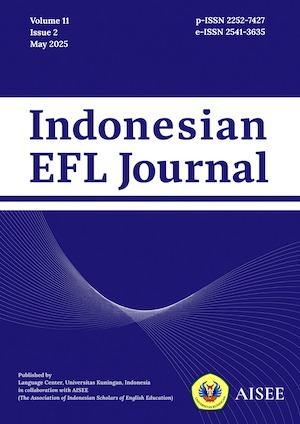BANANA BOOM ICE-BREAKING IN EFL CLASSROOM: STUDENTS’ EXPERIENCES
Abstract
Banana Boom Ice-breaking is one of the most popular activities in the classroom. This study aims to investigate the impact of Banana boom ice-breaking activities on students' enthusiasm for learning and their English skills. This research uses qualitative case study research to know what students felt after doing Banana Boom Ice-breaking. The participants in this study were Junior High School students in Medan, the totalling 28 students in class IX. The data were analysed in two ways: in quantitative methods using content analysis and in qualitative methods using qualitative interpretation based on interviews with participants. The questionnaire consisted of 15 questions that were filled in by 28 students 9th class. The results show that more than half of the students who filled out the questionnaire experienced changes after doing ice breaking. Moreover, in terms of assignments, Banana Boom Ice-breaking can improve students' English skills, which can be seen from the results of this study. It is suggested that educators consider integrating Banana Boom Ice-breaking and similar engaging activities into their teaching practices to enhance students' enthusiasm for learning and foster improvements in their English language skills.
References
Ansari, Jamal Abdul Nasir, and Nawab Ali Khan. 2020. “Exploring the Role of Social Media in Collaborative Learning the New Domain of Learning.” Smart Learning Environments 7(1). doi: 10.1186/s40561-020-00118-7.
Artati, Ni Luh Rahayu. 2021. “Effect of Kahoot As an Ice Breaker on EFL Students’ Motivation.” The Art of Teaching English as a Foreign Language 2(2):89–97. doi: 10.36663/tatefl.v2i2.121.
Baxter, Pamela, and Susan Jack. 2015. “Qualitative Case Study Methodology: Study Design and Implementation for Novice Researchers.” The Qualitative Report 13(4):544–59. doi: 10.46743/2160-3715/2008.1573.
Bean, C. Jhon, and Melzer. 2021. Engaging Ideas: The Professor’s Guide to Integrating Writing, Critical Thinking, and Active Learning in the Classroom. Third. John Wiley & Sons.
Creswell, J. W., Plano Clark, V. L., Gutmann, M. L., & Hanson, W. E. 2003. Advanced Mixed Methods Research Designs. In A. Tash. Sage.
Denzim, Norman K., and Yvonna S. Lincoln. 2011. The SAGE Handbook of Qualitative Research. Sage.
Fayanto, Suritno, Fatimano Halawa, and Tina Duha. 2020. “IMPLEMENTASI ICE BREAKING BERBASIS TEPUK TEPUK UNTUK MENINGKATKAN MINAT SISWA DALAM PROSES PEMBELAJARAN SEMAR Journal : Educations Studies.” SEMAR Journal : Educations Studies XX(Y):1–12. doi: 10.37638/semar.2.1.1-6.
Gares, Sheryl L., James K. Kariuki, and Brian P. Rempel. 2020. “Community Matters: Student-Instructor Relationships Foster Student Motivation and Engagement in an Emergency Remote Teaching Environment.” Journal of Chemical Education 97(9):3332–35. doi: 10.1021/acs.jchemed.0c00635.
Getie, Addisu Sewbihon. 2020. “Factors Affecting the Attitudes of Students towards Learning English as a Foreign Language.” Cogent Education 7(1). doi: 10.1080/2331186X.2020.1738184.
Gilbert, Amanda, Sandi Tait-McCutcheon, and Bernadette Knewstubb. 2021. “Innovative Teaching in Higher Education: Teachers’ Perceptions of Support and Constraint.” Innovations in Education and Teaching International 58(2):123–34. doi: 10.1080/14703297.2020.1715816.
Hargreaves, Andy. 2000. “Mixed Emotions: Teachers’ Perceptions of Their Interactions with Students.” Teaching and Teacher Education 16(8):811–26. doi: 10.1016/S0742-051X(00)00028-7.
Hariono, Tholib, Hilyah Ashoumi, Anggi Septa Mujahadah, and Adriansyah Adransyah. 2021. “Pendampingan Pembelajaran Dalam Pengkondisian Siswa Melalui Ice Breaking.” Jumat Informatika: Jurnal Pengabdian Masyarakat 2(3):125–29. doi: 10.32764/abdimas_if.v2i3.1727.
Hidi, Suzanne E., and K. Ann Renninger. 2020. “On Educating, Curiosity, and Interest Development.” Current Opinion in Behavioral Sciences 35:99–103. doi: 10.1016/j.cobeha.2020.08.002.
Howe, Edward R., and Georgann Cope Watson. 2021. “Finding Our Way Through a Pandemic: Teaching in Alternate Modes of Delivery.” Frontiers in Education 6(May):1–15. doi: 10.3389/feduc.2021.661513.
Hussein, Bassam. 2021. “Addressing Collaboration Challenges in Project-Based Learning: The Student’s Perspective.” Education Sciences 11(8). doi: 10.3390/educsci11080434.
Jennings, Patricia A., and Mark T. Greenberg. 2009. “The Prosocial Classroom: Teacher Social and Emotional Competence in Relation to Student and Classroom Outcomes.” Review of Educational Research 79(1):491–525. doi: 10.3102/0034654308325693.
Jurgelaitis, Mantas, Lina Čeponienė, Jonas Čeponis, and Vaidotas Drungilas. 2019. “Implementing Gamification in a University-Level UML Modeling Course: A Case Study.” Computer Applications in Engineering Education 27(2):332–43. doi: 10.1002/cae.22077.
Kadek Bagus Rusman. 2022. “Implementation and Benefits of Learning through Ice Breaking.” International Linguistics and TESOL Journal 1(1):3.
Kaufmann, Renee, and Jessalyn I. Vallade. 2022. “Exploring Connections in the Online Learning Environment: Student Perceptions of Rapport, Climate, and Loneliness.” Interactive Learning Environments 30(10):1794–1808. doi: 10.1080/10494820.2020.1749670.
Ladson-Billings, Gloria. 2011. “Yes, But How Do We Do It?” Practicing Culturally Relevant Pedagogy. Second. Routledge.
Malik, Ranbir Singh. 2018. “Educational Challenges in 21St Century and Sustainable Development.” Journal of Sustainable Development Education and Research 2(1):9. doi: 10.17509/jsder.v2i1.12266.
Martin, Florence, and Doris U. Bolliger. 2018. “Engagement Matters: Student Perceptions on the Importance of Engagement Strategies in the Online Learning Environment.” Online Learning Journal 22(1):205–22. doi: 10.24059/olj.v22i1.1092.
Mykhailyshyn, Halyna, Oksana Kondur, and Lesia Serman. 2019. “Innovation of Education and Educational Innovations in Conditions of Modern Higher Education Institution.” Journal of Vasyl Stefanyk Precarpathian National University 5(1):9–16. doi: 10.15330/jpnu.5.1.9-16.
Pelletier, Kathe, Mark McCormack, Jamie Reeves, Jenay Robert, Nichole Arbino, with Maha Al-Freih, Camille Dickson-Deane, Carlos Guevara, Lisa Koster, Melchor Sánchez-Mendiola, Lee Skallerup Bessette, and Jake Stine. 2022. THANK YOU TO OUR TEACHING AND LEARNING HORIZON REPORT SPONSORS Learn More Teaching and Learning Edition.
Pratama, Hendrik, Tri Wahyuni Maduretno, and Andista Candra Yusro. 2021. “Online Learning Solution: Ice Breaking Application to Increase Student Motivation.” Journal of Educational Science and Technology (EST) 7(1):117–25. doi: 10.26858/est.v7i1.19289.
Rahman Hz, Benni Ichsanda. 2022. “Exploring Gender Differences in Public Speaking Anxiety.” Sawwa: Jurnal Studi Gender 17(2):247–66. doi: 10.21580/sa.v17i2.14295.
Schensul, S. L., Schensul, J. J., & LeCompte, M. D. 1999. Essential Ethnographic Methods: Observations, Interviews, and Questionnaires. Rowman Altamira.
Schröder, Antonius, and Daniel Krüger. 2019. “Social Innovation as a Driver for New Educational Practices: Modernising, Repairing and Transforming the Education System.” Sustainability (Switzerland) 11(4). doi: 10.3390/su11041070.
Sheninger, Eric. 2019. Digital Leadership Changing Paradigms for Changing Times.
Shuhratovich, Ismatov Ulfat. 2020. “Application of Innovation in Teaching Process.” European Journal of Research and Reflection in Education Sciences 8(5):4–8.









